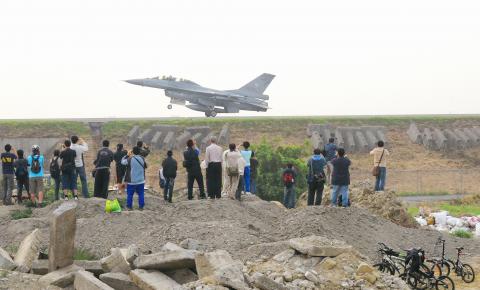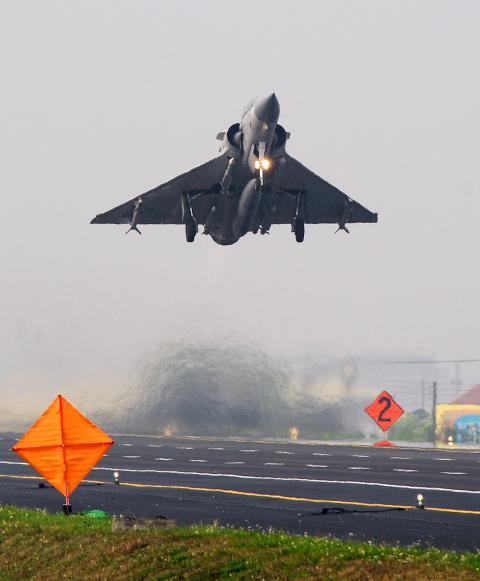The Republic of China Air Force yesterday used a closed-off motorway as a runway in a rare drill simulating a surprise attack from China that had wiped out its major airbases.
In all, six fighter aircraft landed and took off from Freeway No. 1 in an emergency landing and takeoff exercise, under the watchful eye of hundreds of spectators.
The one-hour drill anticipated a scenario in which runways at airbases in Greater Kaohsiung’s Gangshan Township (岡山), Penghu’s Magong (馬公), Pingtung and Greater Tainan were destroyed by three waves of missile attacks by China, forcing the air force to use alternative locations for landing and takeoff, the Ministry of National Defense said.

Photo: Huang Chih-yuan, Taipei Times
“In today’s scenario, we assumed most of Taiwan’s military air bases were severely damaged in an attack by missiles from the People’s Liberation Army, and fighter jets could not return to their home bases,” an air force spokesman told reporters.
“Because of that we needed to convert some sections of the freeway to serve as emergency runways ... and for that purpose, we need to check the standard procedures, like clearing up the road surface, setting up communications networks and installing plane arrest cables,” he said.
In the exercise, which began at 7:26am in heavy fog, two Indigenous Defense Fighters (IDF), two F-16A/Bs and two Mirage 2000s landed on a 2.7km stretch of Freeway No. 1 in the Madou area of Greater Tainan. More than 1,300 members of the armed services participated in the exercise.

Photo: AFP
The IDF fighters took off from Tainan Air Base, while the F-16s and Mirage 2000s took off from Chiashan Base (佳山) in Hualien County.
To ensure the planes could land safely, a large number of soldiers were ordered to carry out a meticulous search for stones or other small objects on the road.
Several cars also drove along the motorway, releasing high-frequency sounds to scare away birds that might be sucked into the turbines of the jets.
As the six combat aircraft landed on the freeway, an army OH-58D scout helicopter carried out surveillance and an AH-1W Super Cobra attack helicopter provided protection for a CH-47 Chinook transport helicopter carrying bombs and missiles for the fighter aircraft.
Security checks, refilling and missile reloading on the six aircraft were accomplished within one hour. Each IDF aircraft was loaded with six Mk 82 bombs, while each F-16 was fitted with AGM-65 Maverick and AGM-84 Harpoon missiles and the Mirage 2000s were loaded with MICA missiles.
At 8:26am, the six combat aircraft took off at intervals of one minute.
The Madou section of the freeway was closed from 4am until 10am yesterday.
The drill was part of the five-day Han Kuang 27, an annual series of exercises that began on Monday and end on Friday.

CHAOS: Iranians took to the streets playing celebratory music after reports of Khamenei’s death on Saturday, while mourners also gathered in Tehran yesterday Iranian Supreme Leader Ayatollah Ali Khamenei was killed in a major attack on Iran launched by Israel and the US, throwing the future of the Islamic republic into doubt and raising the risk of regional instability. Iranian state television and the state-run IRNA news agency announced the 86-year-old’s death early yesterday. US President Donald Trump said it gave Iranians their “greatest chance” to “take back” their country. The announcements came after a joint US and Israeli aerial bombardment that targeted Iranian military and governmental sites. Trump said the “heavy and pinpoint bombing” would continue through the week or as long

TRUST: The KMT said it respected the US’ timing and considerations, and hoped it would continue to honor its commitments to helping Taiwan bolster its defenses and deterrence US President Donald Trump is delaying a multibillion-dollar arms sale to Taiwan to ensure his visit to Beijing is successful, a New York Times report said. The weapons sales package has stalled in the US Department of State, the report said, citing US officials it did not identify. The White House has told agencies not to push forward ahead of Trump’s meeting with Chinese President Xi Jinping (習近平), it said. The two last month held a phone call to discuss trade and geopolitical flashpoints ahead of the summit. Xi raised the Taiwan issue and urged the US to handle arms sales to

State-run CPC Corp, Taiwan (CPC, 台灣中油) yesterday said that it had confirmed on Saturday night with its liquefied natural gas (LNG) and crude oil suppliers that shipments are proceeding as scheduled and that domestic supplies remain unaffected. The CPC yesterday announced the gasoline and diesel prices will rise by NT$0.2 and NT$0.4 per liter, respectively, starting Monday, citing Middle East tensions and blizzards in the eastern United States. CPC also iterated it has been reducing the proportion of crude oil imports from the Middle East and diversifying its supply sources in the past few years in response to geopolitical risks, expanding

Pro-democracy media tycoon Jimmy Lai’s (黎智英) fraud conviction and prison sentence were yesterday overturned by a Hong Kong court, in a surprise legal decision that comes soon after Lai was jailed for 20 years on a separate national security charge. Judges Jeremy Poon (潘兆初), Anthea Pang (彭寶琴) and Derek Pang (彭偉昌) said in the judgement that they allowed the appeal from Lai, and another defendant in the case, to proceed, as a lower court judge had “erred.” “The Court of Appeal gave them leave to appeal against their conviction, allowed their appeals, quashed the convictions and set aside the sentences,” the judges